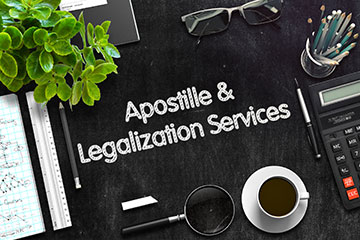What is an Apostille?
 If United States-issued documents are to be used in a foreign country, a legalization process is required to validate them for use abroad.
If United States-issued documents are to be used in a foreign country, a legalization process is required to validate them for use abroad.
Always check on the country of your document destination before you order an apostille.
There are two types of authentication for foreign documents provided by the Secretary of State office: the documents can either be apostilled or certified. If your document is going to be used in a member-country of the Hague Apostille Convention, of which the United States is also a member, your document will be authenticated with an apostille. Only the countries-participants of the Hague Apostille Convention will accept a foreign document endorsed with an apostille by the Secretary of State. If you are going to a country that is not part of the Hague Apostille Convention, your document will require a Secretary of State certification.
The purpose of authentication process is to confirm that a US-issued document along with signatures on it are legitimate. The Secretary of State certification permits foreign countries to accept US-issued documents as original and originating from the United States. Before you start your document authentication, check whether the country where you are planning to use your document is a Hague Apostille Convention member or not, as it will determine the process of legalization. Apostille service is a universal form of document verification between countries-members of the Hague Apostille Convention. Since foreign countries are typically not familiar with the US-issued documents, an apostille serves as proof that a document is original and legitimate.
If a document was not issued by the government office, like a Power of Attorney, which permits a person to legally represent and sign on behalf of another person or a company, it is even more important that such documents are properly legalized to be accepted abroad.
Legalization Process
In the legalization process, officials legalizing the signature of the official on the document that was signed.
Examples:
1. An individual in Florida signs an original document in front of a Florida Notary Public that authenticates the person’s signature.
2. The County Clerk in Florida certifies the Notary’s signature.
3. The Florida Secretary of State authenticates the Clerk’s signature and issues the apostille.
If a document needs legalization by the Embassy:
1. The United States Department of State confirms the Florida Secretary of State’s authentication
2. The Embassy of the destination country then confirms the authentication by the United States Department of State.

